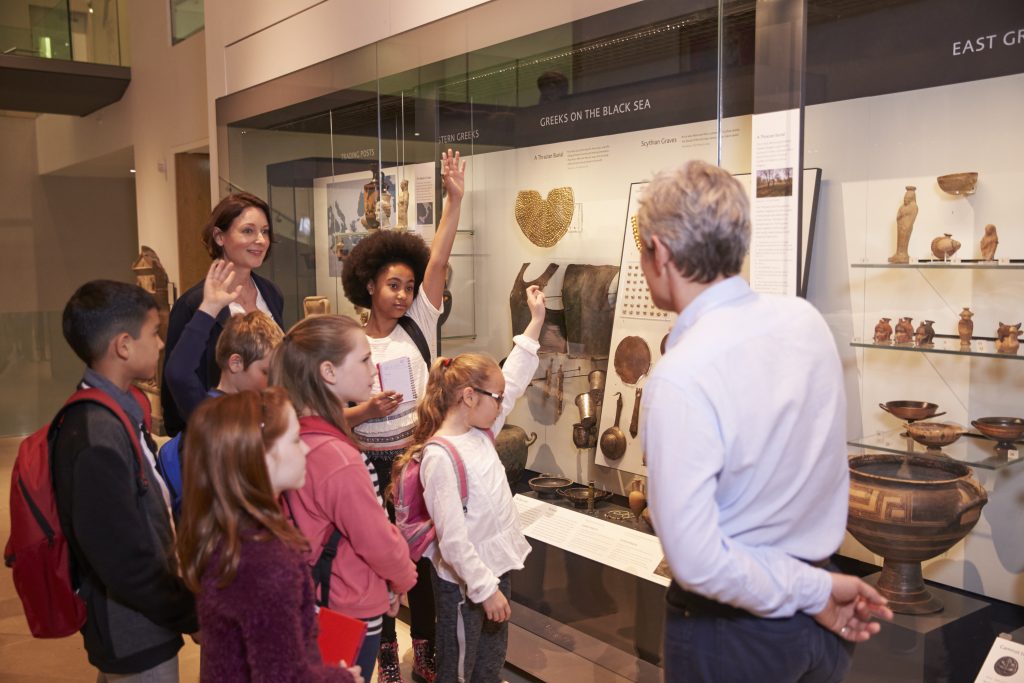There are many different career paths taken by history graduates. Becoming a historian is one path history majors take. But there are jobs like historian occupations that are good for many history majors.
From attorneys to writers, there are interesting careers for history buffs. You can get jobs with history degrees or history jobs without a degree. The point is, there’s a career path for everyone. Read on to find out which jobs in history are available.
Featured Programs
15 Unique Jobs in the History Field
History graduates have a deep understanding of the discipline. By studying history, you develop many transferable skills. From speaking skills to critical thinking skills. History programs teach you how to read, write, and communicate. These universal skills make you more attractive to potential employers.
Below you’ll find a list of 15 jobs for people who like history.
- Fiction Writer
- Film and TV Writer
- Set and Costume Design
- Multimedia Designer
- Actor
- Attorney
- Journalist
- Park Ranger
- History Professor
- Museum Curator
- Anthropologist/Archaeologist
- Historic Preservation
- Research Analyst
- Arts Law Enforcement
- Exhibit Designer
“We are not makers of history. We are made by history.”
–Martin Luther King, Jr.
1. Fiction Writer
For ardent book fans, the world can never have too many books. Book lovers can’t get enough of the fictional worlds their favorite writers create.
This is true for genre fiction lovers. Over the years, historical fiction books, like “Beloved” by Toni Morrison and “Roots” by Alex Haley, have become major motion pictures.
History graduates develop strong writing skills. These skills help you on your path to becoming a historical fiction writer. In your history classes, you also develop your reading and critical thinking skills by exploring books such as:
- The Great Gatsby by F. Scott Fitzgerald
- The Bread Givers by Anzia Yezierska
- The Man in the Gray Flannel Suit by Sloan Wilson
The books you read give you insight into historical time periods. Reading great books, coupled with your fiction writing practice, helps you improve your writing skills. Successful authors spend a lot of time reading books in and out of the genre they write.
Like some history jobs, you don’t need a graduate degree to become a writer. But most history degree jobs ask for a degree in history.
2. Film and TV Writer
There are many jobs history degrees will get you, but none as cool and coveted as a film and television writer.
With subscription-based channels, like Amazon, HBO, Hulu, and Netflix, the demand for new and engaging content is higher than ever. Programs like “Peaky Blinders” or “The Crown” rely on history to tell the story.
Because of their knowledge of history, history students bring insight to the writing table. Many work as scriptwriters. Others become historical consultants or script doctors for period shows. Some are documentary writers and filmmakers, such as Ken Burns, director of:
- “The Civil War
- “The Dust Bowl”
- “The Roosevelts: An Intimate History”
What’s even better news for aspiring film and TV writers is that you don’t have to live in New York or LA to work in the industry. Indie film and TV projects have increased in number. Atlanta has become a major hub for film. You can also find work in your local area.
3. Set and Costume Designer
If writing isn’t where your passions lie, but you’re creative, then consider set and costume design. Historians provide information about the historical background for period TV, stage, and film productions. These historians advise the production department on historical costuming or sets.
There is an impressive list of media production companies and TV channels who hire people with a history degree because of their knowledge in time periods. Companies include:
- BBC
- History Channel
- PBS
These professionals have a specialized background in history. Some have extensive knowledge in the Victorian era and replicate period dress right down to the last stitch in the corset. Others capture the look of the Roaring Twenties. You find these specialized jobs for history lovers on sets for Gentleman Jack and The Queen’s Gambit.
4. Multimedia Designer
The demand for multimedia designers has grown in recent years. Most of the growth has come from the popularity of video games and digital animation development.
Multimedia designers spend their days creating websites and mobile apps.
- Software programs
- Video and audio files
Multimedia jobs are for those who specialized in history subjects, like theatrical or art history. They are for those who love technology. These two skill sets allow the designer to communicate with art directors. They also advise production managers on the historical accuracy of a:
- Video game
- Website
- A mobile app or website for a historical museum
If you have a history degree and want to work as a multimedia designer, then you’ll need to know more about the technology used on the job. You’ll also want to learn about:
- Video and audio production
- Character design
- Web development
To achieve this, you can learn the technical skills on your own or take on a double major.
5. Actor
Actors play characters in movies, TV shows, and in stage productions. The demand for actors is favorable due to the online gig economy. Places that hire actors include:
- Independent film production companies
- Voice-over businesses
Other entertainment outlets also need the services of talented actors. The explosion of internet-based entertainment has a lot to do with demand.
Do you want to develop a reputation as an actor who works in period pieces? You’ll need to build a reputation as an actor who specializes in these roles. You will also need specialized knowledge in the time period.
Actors with a history degree also find work in historical consulting. They work on movies and TV. This specialized knowledge helps you pick up freelance work, which can supplement your income.
Preparing for Your First Role
After you earn your history degree, you will need to prepare for the job. You need headshots and clips from other acting gigs. If you don’t have previous work to show, make a demo reel from tryouts or work you did in school. This gives potential casting directors a chance to see your work.
If you do voice-overs, don’t forget to include samples. You can include voice-overs you’ve done for movies or commercials. You can also use work you’ve done narrating books.
Your history degree will help you develop your analytical skills that improve your craft.
6. Attorney
One of the best jobs for history majors is in law. An attorney’s skills match those of a historian. The career paths are similar in terms of research. A historian spends a lot of time researching. Lawyers, too, spend their days researching case history.
Work of an Attorney
Attorneys must analyze information for cases. They study documents and determine if any legal precedence applies to the case. Attorneys also draft legal documents, such as:
- Briefs
- Mortgage contracts
- Wills
If the attorney is a trial lawyer, then they spend time speaking in front of a crowd of people. They have skills in reading, writing, and oral communication. They also know how to critically think and analyze.
But to become an attorney, you will need a bachelor’s degree, and a law degree from law school. Some people earn a master’s degree along the way to getting their JD. The analytical skills gained in law school help aspiring attorneys on their career path.
7. Journalist
Jobs for history buffs include the role of a journalist. A degree in history prepares a journalist in different ways.
The historian’s ability to read large amounts of text and analyze are great assets. These analytical skills allow you to look at events in a greater historical and cultural context. You also learn how to make connections and spot trends in history.
The skills you learn in a history degree program transfer to journalism, among other subjects like political science. A journalist writes about world history in the making.
History Degree for Journalism
Your world history degree teaches you how to research and write. You use these skills every day when working as a journalist. A bachelor’s degree in history gets you used to working with primary source documents, such as:
- Old letters
- Photographs
- Other materials
You can use these valuable skills as you report on historical events, such as:
- Natural disasters
- Unsolved crimes
Having a historian’s research abilities trains the would-be journalist to analyze the validity of each news source.
In a time where misinformation and disinformation abounds, it’s important to know how to fact-check news stories and reports. A history major has these skills, and it’s one of those jobs similar to historian work.
8. Park Ranger
Unique jobs if you like history are out there, but they take some work to find. The role of park ranger is one of the most unique jobs as a history major. But how does the job fit with a history degree?
Much of the park ranger’s job involves outdoor skills, such as trail and wildlife management. But there is a historical aspect to the job. Many rangers also run interpretive centers and historical sites. They talk about the history of a place to visitors. They answer questions about exhibits and lead guided informational tours.
History Training for Park Rangers
But to do the job, they must go through training. Park rangers at interpretive centers study history. They pick up a bachelor’s degree or a master’s degree in history. Others train in:
- Conservation
- Forestry
- Law enforcement
Job requirements vary by location. But most park rangers get their start by working seasonal jobs.
9. History Professor
Teaching history at the college level is a history major’s dream. How could it not be? You earn good money and get to use your history education.
You conduct research on areas of interest. You also get to share your work with colleagues and prepare it for publication. Every day on the job, you get to put your research skills to the test. And you share your knowledge with students. In a sense, you help shape the historical minds of the future.
Tenured history professors conduct research in their field and publish their findings. They explore little-known pockets of world history and get paid for it. A history professor’s career paths might take them:
- To the banks of the ancient Nile River
- To a cabin in the woods that supported the Underground Railroad
But to work as a history professor, you need more than one history degree. You will need a bachelor’s degree, a master’s degree, and a PhD. Plan on spending years of your life in a history program. But when you graduate, you can put your advanced degree to work for a lifetime.
10. Museum Curator
Museum curators have degrees in history or related areas of study. They spend their days looking over:
- Antique paintings
- Digital archives
- Exhibition creations
- Historical artifacts
- Historical documents
- Sepia photographs
- 3D simulations of ancient cities
What the Job Requires
The history major fits into this environment because the job requires a thorough understanding of history. A curator creates exhibits that are cohesive in theme and presentable to the public.
The job also demands persuasive skills, which history students learn in school. Much of a curator’s job revolves around fundraising with nonprofit organizations. They must also write, speak, and persuade the public. These are all skills taught in a history program.
To work in these history careers, you need at least a bachelor’s degree. Most curators have a master’s degree or have gone to law school and earned graduate degrees. Their in-depth study allows them to provide perspective to patrons.
11. Anthropologist or Archaeologist
A history degree can prepare you for interesting career paths. One such path is the role of an anthropologist or archaeologist. While both anthropology and archaeology are standalone majors, they overlap in profession.
Anthropology is the study of human behavior. Archaeology delves into humanity’s past. History is the study of people, ideas, and events of the past. The study of history can provide an anthropologist or an archaeologist with additional context for the job.
History and Anthropology
A history major can become an anthropologist or archeologist. But they must have a bachelor’s degree and a master’s degree in the field.
An undergraduate major in history (bachelor’s degree) helps the future archeologist or anthropologist learn how to interpret historical documents and artifacts. A graduate degree, such as a master’s degree, gives more in-depth study. You can showcase your knowledge to an employer by going to grad school.
The setting for these history jobs varies. An archaeologist might work for the local transportation board to ensure that no new construction encroaches on land with historical significance. The anthropologist can run an interpretive center. They can also work at government agencies, such as the American Historical Association.
Teaching is also a possibility. You can become a high school history teacher or college professor with the right history degree.
12. Historic Preservationist
Is preservation of important historical sites, documents, and artifacts important to you? Then consider a career as a historic preservationist. Your tasks include recording and restoring. You also preserve artifacts and other items of scientific or historical significance.
The items you preserve go on display in exhibits. You also showcase them in the museum’s archival area. Once an exhibit is done, you’re responsible for putting the artifacts away for safekeeping.
The job can overlap with the curator role. But this depends on the size of the organization that the preservationist works for.
History majors do well in this profession. It is one of the most interesting career paths for prospective history students. Not only do you spend your days surrounded with historical documents and artifacts, you also put your research skills to the test.
13. Research Analyst
Other careers in history are research-heavy. A research analyst puts their advanced degree in history to work. They get paid to read, write, and research.
Research analysts sift through data. They analyze it and condense it into a readable report. They use their analytical skills to fact check and cross-reference information. Some companies refer to the research analyst job as a political scientist. This depends on the organization you work for.
Where Research Analysts Work
Research analysts work in:
- Educational programs
- Financial institutions
- Government agencies
- Insurance companies
- Legal research
- Publishing companies
Most research analysts hold a master’s degree, or another advanced degree. They have strong writing skills and critical thinking skills. They also have historical knowledge in their niche area of research.
14. Arts Law Enforcement
Another job for history majors that ranks high in the coolness factor is an agent in arts law enforcement. For people who studied art history as a specialization, there is the FBI’s Art Crime Team. This 20-person task force investigates crimes involving:
- Art theft
- Counterfeiting
- Fraud
Since its start in 2004, this specialized crime unit has recovered $800 million in stolen artwork. Historians who work in this unit must have both an understanding of art history and the law as it relates to art theft and fraud.
It is one of the most coveted history jobs because there are few positions. To be a good candidate for the job, you must stand out. Candidates have a doctoral degree or completed a graduate program in history and art.
15. Exhibit Designer
An exhibit designer creates the exhibits that people see when visiting:
- Corporate art collections
- Galleries
- Interpretive centers
- Museums
There are a limited number of degrees in exhibit design. But not too long ago, there were none. Today, though, there are graduate programs that give you a strong background in history and exhibit design. Some master’s degree programs let students specialize their advanced degree in history in subjects like visual art and theater.
You learn how to work as an exhibit designer doing tasks that include arranging pieces of art in a way that explains contexts to audiences.
Some exhibit designers create an exhibit about science fiction literature and TV. They feature photos and clips from books and movies. They present an exhibit to the public. If the featured book or TV show had special significance in the past, they highlight the exhibit’s educational materials.
There are many career paths to take in history. Below we detail more jobs for people with key skills in history and research.
More Jobs For History Lovers
The above 15 jobs in history are not the only ones out there. You can find history degree jobs in any sector and industry. Legal research needs history buffs. Political scientists rely on past events to help them understand political systems and governments. Library science wants knowledgeable people. The point is, there are many different career paths for history majors.
More History Degree Jobs
- Director of nonprofit organizations
- Labor statistics researcher
- Military history consultant
- Political scientist
- University professors
Other Degrees for History Buffs
- Bachelor’s Degree in Library Science
- Bachelor’s degree in Sociology
- Master’s Degree in Library Science
- Master’s Degree in Political Science
Conclusion
As a history major, you learn a broad range of skills throughout your studies. History taught you how to read, write, and analyze. Now the door is open to history degree jobs. From political scientists to history teachers, the sky’s the limit on the many careers for history majors.
Employers look for candidates with excellent communication and analytical skills. They want people who can conduct research and problem-solve. And if you have a specialty, that’s even better. Some employers look for history majors with foreign language skills or an art history background.
History majors are curious, creative, and insightful people. They look at the past to help them inform the future. It is their knowledge and background that makes them a commodity in the workforce. Whether you want to be a political scientist or museum curator, your history major will help. And there are many unique history careers out there.
BDP Staff
Related Resources:
- 30 Best History Degree Online Programs (Bachelor’s)
- What Jobs Can You Get with a History Degree?
- 5 Fascinating Careers in Travel for History Majors
- 5 High Paying Careers for Someone with a History Degree
- 5 Ways a History Degree Can Help You in the Field of Media Communications




